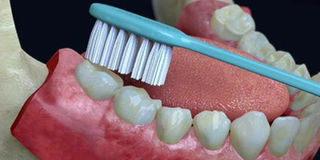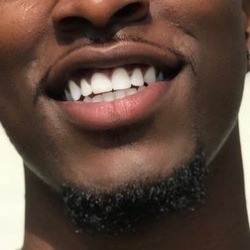What toothbrush should I use?

Do not apply much pressure while you brush. This not only shortens your brush’s lifespan but is also harmful to your gums and teeth. PHOTO | COURTESY
There is no doubt that good oral hygiene is important. One of the ways this is maintained is by using a toothbrush to clean your teeth, gums and tongue. However, sometimes, one is spoilt for choice given the many kinds of toothbrushes available. When buying a toothbrush, one should consider the following:
1. The size should be optimal so that the brush can reach the back teeth. A larger toothbrush may not reach the back teeth properly and this can put you at risk of tooth decay.
2. The bristles of the brush also matter. Normally soft bristles are gentle on the gums and teeth. Hard bristles can cause injury to your gums and your tooth enamel to wear out. The hard bristles are normally recommended for stained teeth but should not be used often.
3. Age is a factor as well. Young children should be given toothbrushes that are suitable for their age group. A child should never use an adult’s toothbrush as it will not reach the back teeth. They must also be guided on how to brush properly.
4. Nowadays, some toothbrushes come with a surface that can be used to brush the tongue although tongue brushes are also available.
5. People with braces or crowded teeth should consider getting interdental brushes to help them clean in between their teeth.
What about electric toothbrushes?
There is nothing wrong with electric toothbrushes. There are no studies to show that they may do a better job than manual toothbrushes. However, both must be used correctly for the best results.
What about the Muswaki?
The muswaki comes from the toothbrush tree (Salvadora persica). It actually works well although might have to be changed quite often.
Care for toothbrushes
When caring for your toothbrush, consider the following:
1. Wash your hands before using it.
2. Do not apply much pressure while you brush. This not only shortens your brush’s lifespan but is also harmful to your gums and teeth.
3. Wash your toothbrush after brushing your teeth.
4. Change it every three to four months or when the bristles spread out.
5. Avoid sharing toothbrushes as this is one way of spreading diseases.
6. Keep the toothbrush dry; avoid moist environments as this can cause bacteria and algae to grow on it.
7. Only cover the brush when travelling.
Most toothbrushes will work well. However, you must ensure that you use it correctly and care for it well. If you have a child, ensure that you are guiding them on how to brush. Most importantly, do not forget to have regular dental check-ups.
Dr Natasha Lubega is a dental surgeon at Pan dental Surgery




